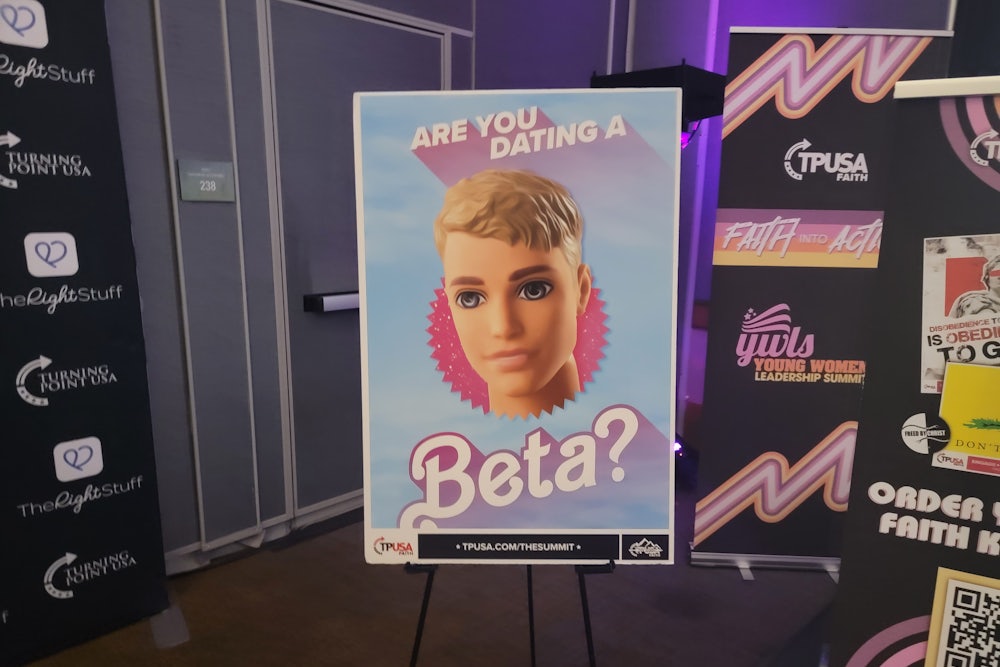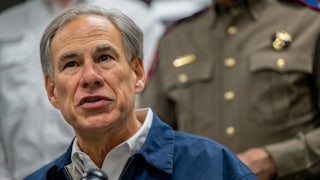The doors open 15 minutes early. A river of rompers and go-go boots and diaphanous floral print flows up the stairs, past multiple ring-lit selfie stations and toward the darkened entrance. The bass is getting louder as we draw near, the melody becoming clearer until it abruptly resolves itself into Katy Perry’s “Teenage Dream” and we plunge into the cotton-candy disco world of Turning Point USA’s Young Women’s Leadership Summit.
Soft pink light half-illuminates thousands of chairs, while the largest disco ball I have ever seen bathes the ceiling in drops of mercury. The screen behind the enormous stage is neon sherbet, and strobe lights beckon us forward. The two girls directly in front of me exchange a look of giddy excitement before rushing to find seats. I take my cue to do the same. Next to me, a young woman from Arkansas holds an astonishingly well-behaved baby on her lap. As DJ Bad Ash—blonde, beautiful, and tremendously pregnant—monitors her laptop in a form-fitting purple cocktail dress, the sherbet screen turns into a countdown to the main event.
Say what you want about TPUSA: The conservative youth organization knows how to throw a party.
It is the evening of Friday, June 9, in Dallas. Mere hours before this event began, President Trump was indicted. But that bad juju can’t puncture this ballroom; only Charlie Kirk, TPUSA’s founder and president, and Representative Marjorie Taylor Greene will be gauche enough to devote an entire sentence to these “salacious, wrongful, horrible charges” before moving on. And yet nearly every speaker has something to say about the successful Bud Light boycott and Target intimidation campaign. Somebody call DJ Khaled: All we do inside these walls is win.
The ostensible agenda of this conference, though, is to mold a new generation of female leaders in the conservative movement, and to that end it has drawn well over 2,000 girls and women between the ages of 15 and 26. They take selfies and exchange numbers and show off their best 1970s attire, but they also listen, rapt, to every girlboss that takes the stage. Lurking beneath every speech, and sometimes explicitly raised, is an allegedly simple question that conservatives have used to troll the libs for years: What is a woman?
For three straight days, the conference struggles to answer it.
Allie Beth Stuckey is a conservative Christian podcast host for Blaze TV, anti-abortion advocate, and author of You’re Not Enough (And That’s Okay): Escaping the Toxic Culture of Self-Love. But she’s not afraid to go heterodox, either—she’s criticized fellow conservatives for sexism before, and she criticized their more extreme views on women here at YWLS.
“Women, specifically, are being pulled in a variety of directions when it comes to our identity and who we are called to be,” Stuckey told us. “If you’re scrolling through social media, you either see that you’re supposed to be making sourdough bread or you’re supposed to become the CEO … and some days you’re told that you need to do both.”
The question is politically polarizing, so the answers on offer are increasingly extreme. “From one group [we hear] that we have to kill our babies to be successful, from another group that the only value that we bring to the table is having children,” she said. “From one camp we hear that marriage is a trap to avoid, from another that marriage is the only goal to which we should be striving.” Social media tells women they are boss babes and perfect just the way they are, but also, in the same breath, that “we are never going to be good enough, we’re never pretty enough, we’re never going to be talented enough. We’re never going to be traditional enough or we’re never going to be feminist enough. We’re never going to be smart enough, we’re never going to be strong enough. It’s a mess!”
The answer, according to Stuckey, is neither career nor marriage but God’s plan for you as an individual: a conclusion that, beneath the born-again language, can be read as quite progressive. There could be many ways to be a woman, in theory; as many answers as there are individuals. All that is required, she says, is “to do the next right thing with faith and excellence and for the glory of God.”
Over the course of the conference, however, it became evident that God’s plan for women tends toward the specific. One after another, the powerful conservative women who spoke told us that their many great accomplishments paled in comparison to the joy of being a mother. “The most influence you can ever have in your life is with your children,” said Representative Lauren Boebert. “When you die the world forgets you,” Candace Owens mused, “but your family never does.”
“[It] is a lie to tell women that we can have it all,” Alex Clark, TPUSA’s parasocial gossip girl in chief, told us. “We can have it all, but we have to plan accordingly. It might have to happen at different times.”
“There’s nothing wrong with being driven to your career,” Kirk told a young woman who asked whether she should pursue her dream of becoming an orthopedic surgeon and put off thoughts of family until her thirties. “If you want to just say all career all the time, maybe it will work for you. But the evidence is overwhelming: That will lead to an empty life.”
TPUSA chief creative officer and professional meme-lord Benny Johnson put it a bit more bluntly. “There ain’t nothing wrong with being a tradwife. Being a trad is based!”
Johnson’s own trad, Nurse Kate, joined him onstage with their two tiny blonde toddlers for a brief Q&A session. The family appeared again at a 45-minute breakout session—“Hot Mom Summer”—and if the happy family thing is an act, it’s a damn good one. Johnson, who uses the word “based” unironically and recently recorded himself throwing a tantrum over a rainbow-clad “toddler mannequin” in his local Target, displayed sweet and patient gentleness with his two daughters and adoration for his stay-at-home wife, currently pregnant with their third child.
During lunch on the second day, there was an opportunity to become part of this picture-perfect family—at least, for the 15 seconds it took a TPUSA volunteer to snap a photo. The line for this opportunity hit capacity almost immediately, and it’s not difficult to see why. When conservative women talk about marriage and family, this is the life they dream of. They do not imagine a controlling jerk of a husband, nor do they dread the drudgery of child-rearing; they want an assertive but loving partner and the hard but joyful work of motherhood. This life is not for everyone—it is not for me—but for the right person, under the right conditions, it can be beautiful.
As we file out of the breakout session, the young woman in front of me moans, “I’ve never wanted a baby so bad in my life.”

“Are you ready to see this degenerate rotten culture that we’ve been living in get a makeover?” Alex Clark, glamorous and bubbly—the very first speaker on the very first day—asked her enthusiastic audience. She looked a bit more 1960s than ’70s with her beehive hair and a sequined shift dress. Kirk has tapped her to open the conference with four feminist lies that conservative women need to stop believing.
“We’re gonna start with birth control,” she told us.
Here’s how it works—at least according to Alex Clark. You start popping progesterone as a teenager, which messes with your mood, your personality, and—most crucially—your fertility. Then, when you realize in your mid-thirties that you want a family after all, you come off the pill and try to have a baby. By then, it might be too late—you’re way past peak babymaking even without the pharmaceutical ravages of birth control. Enter “Big Fertility”: ready to charge you an arm and a leg for IVF and that final shot at parenthood. That’s how they get you. That’s their whole plan.
Clark didn’t really go into what should replace hormonal birth control if you’re not ready for children, but there is no Plan B once pregnancy happens, metaphorically or literally. “Contrary to the feminist narrative, when you get an abortion, you will not feel free,” she said. “You will feel traumatized for life. It’s not a matter of if that feeling will come, but when.”
The influencer saved her most controversial take for last: Daycare is feminist garbage too. It raises cortisol levels in children. It creates disordered attachment styles. It is pernicious poison, Marxist cancer. “I believe the feminist movement is in large part to blame for the fracturing of the traditional home, where women were coerced outside of their natural roles as mothers into the workforce,” Clark said.
The beauty of saying two things at once is you can quote either, as it suits you. Everyone, including Alex Clark, pays lip service to the concept of choice and a potential career outside the home. Listen closely, though, and you’ll find that only one type of choice is correct. You can prioritize career over children—you’ll just feel empty inside if you do.
But if that’s true, what is the explanation for every single woman who graces the YWLS stage? All have careers outside the home, all occupy what Clark considers an unnatural role, and most violate Clark’s edicts to make it work. Candace Owens and Lara Trump employ nannies to help raise their children. Laura Ingraham and country music sensation Raelynn almost certainly do as well. Alex Clark herself, who hosts a videocast four days a week and records a weekly podcast, is unmarried and childless. The only person who comes close to Clark’s “natural” ideal is Nurse Kate—Benny Johnson’s wife—and she appears in public plenty.
Clark is half-right, though. Something is coercing women who would prefer to stay at home to work outside it: economic policies that Republicans traditionally endorse. In her speech, Clark acknowledges that maternity leave is insufficient. She acknowledges that for single mothers, working might be the only choice. She says these words, then says many, many more about choices and sacrifices and responsibility but offers no ideas for how to change the conditions that necessitate dual-income households so often, even when one parent would prefer to stay home. She does not talk about how, starting in the disco era that the conference paid tribute to, real wages have remained stagnant while the cost of living has skyrocketed, or the fact that 25 percent of our shared millennial generation still lives with their parents. She does not advocate for better maternity leave or tax code reform or a long hard look at late-stage capitalism. As always, the conservative solution begins and ends with bootstraps.
By making the feasibility of full-time motherhood a purely biological issue, Clark and Kirk and the rest allow the movement to redirect the rage and disappointment many of these women will feel at a target they can actually hurt: the LGBTQ+ community.
“Transgenderism, in its current form in America, is nothing more than weaponized tyrannical patriarchy to come after women,” Kirk said, shortly after threatening to book next year’s conference somewhere else if the center did not take down their pride flag. Chaya Raichik spoke about the teachers trans-ing our youth. “Tolerance is about acceptance, acceptance is about control,” radio talk show host Dana Loesch declared in the middle of a 17-minute rant against trans people, gay people, and feminism. The message is one I remember from my youth but had not heard for years until recently: The gays are destroying the family. They’re the reason we can’t live in the 1950s anymore.
The transfer of anger is working—at least in this room. The audience’s loudest cheers came in response to anti-trans rhetoric. It is easy to believe they are in the majority, that their movement is gaining ground. That once they end the woke nightmare, their teenage dream can start.
Outside, though, where Trump faces a maximum of 400 years in prison, and judges are blocking anti-trans legislation, and transphobic platforms continue to lose elections, the pride flag waves peaceful and steadfast in front of the convention center, against the blue Texas sky. The young women climb aboard their planes. The disco ball comes down. The alternate world blinks out. It’s over.






